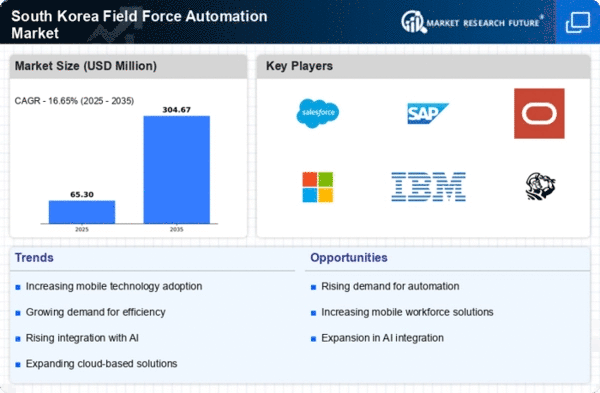Growth of Mobile Workforce
The field force-automation market in South Korea is significantly influenced by the growth of the mobile workforce. With an increasing number of employees working remotely or in the field, there is a pressing need for tools that enable effective communication and task management. Mobile solutions allow field workers to access critical information and update their status in real-time, which enhances collaboration and decision-making. Recent statistics indicate that over 50% of South Korean companies have adopted mobile solutions to support their field teams. This trend is likely to continue, as organizations recognize the importance of equipping their workforce with the necessary tools to operate efficiently in a dynamic environment. The field force-automation market is thus positioned to expand as businesses invest in mobile technologies.
Integration of Advanced Analytics
The integration of advanced analytics into field force-automation solutions is becoming a pivotal driver in South Korea. Companies are increasingly utilizing data analytics to gain insights into field operations, customer behavior, and market trends. This analytical approach allows organizations to make informed decisions, optimize resource allocation, and enhance service delivery. The field force-automation market is witnessing a rise in demand for solutions that incorporate predictive analytics, enabling businesses to anticipate challenges and respond proactively. As organizations recognize the value of data-driven decision-making, the adoption of analytics in field force automation is expected to grow, potentially leading to improved operational outcomes.
Rising Demand for Operational Efficiency
The field force-automation market in South Korea experiences a notable surge in demand for operational efficiency. Companies are increasingly seeking solutions that streamline processes, reduce manual tasks, and enhance productivity. This trend is driven by the need to optimize resource allocation and minimize operational costs. According to recent data, organizations that implement field force automation can achieve efficiency improvements of up to 30%. As businesses strive to remain competitive, the adoption of automation technologies becomes essential. The field force-automation market is thus witnessing a shift towards integrated solutions that facilitate real-time data access and task management, ultimately leading to improved service delivery and customer satisfaction.
Emphasis on Customer Experience Enhancement
In the field force-automation market, there is a growing emphasis on enhancing customer experience. Companies are increasingly aware that providing exceptional service is crucial for retaining clients and gaining a competitive edge. Automation tools enable businesses to respond to customer inquiries more swiftly and accurately, thereby improving overall satisfaction. Data suggests that organizations that prioritize customer experience can see revenue growth of up to 20%. As a result, the field force-automation market is evolving to include features that focus on customer engagement and feedback mechanisms. This shift indicates a broader trend where businesses are leveraging technology to create personalized experiences for their clients.
Government Initiatives Supporting Digital Transformation
Government initiatives in South Korea aimed at promoting digital transformation are significantly impacting the field force-automation market. Policies encouraging the adoption of technology in various sectors are fostering an environment conducive to innovation. The government has allocated substantial funding to support businesses in their digitalization efforts, which includes the implementation of automation solutions. This support is likely to accelerate the growth of the field force-automation market as companies leverage these initiatives to enhance their operational capabilities. The alignment of government objectives with industry needs suggests a promising future for automation technologies in South Korea.
















